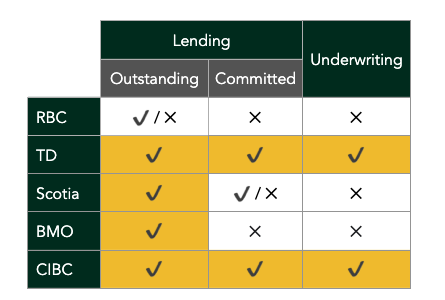And other key updates to RBC’s net zero commitment
In case you don’t have the time to sift through RBC’s recently released 150-page Sustainability Report, below we identify key updates to its climate commitment. In brief, we note a mix of updates, namely:
- RBC abandoning its potentially misleading sustainable finance target as a key metric of progress towards its net zero target and focusing instead on smaller, but potentially more meaningful climate solutions and low-carbon energy targets.
- Undue emphasis on recent amendments to Canada’s Competition Act, which requires environmental claims to be defensible, as an excuse for not disclosing its energy supply ratio (ESR).
- Minimal progress on the bank’s oil and gas client engagement escalation.
- Concerning signals of RBC’s intention to back away from its oil and gas interim and 2050 net zero target based on an unwillingness to take any concrete actions to achieve them, instead painting itself as a passive recipient of market forces.
RBC abandons sustainable finance target as a key metric of net-zero progress
We are interested to see RBC announce that it is abandoning its $500 billion sustainable finance target as an indicator of progress towards its net-zero goal. Last year, we highlighted how overly broad bank sustainable finance targets were not fit for purpose in our Securities Commission complaint. In it, we argue that highlighting broad sustainable finance targets within a bank’s climate plan was a potentially misleading practice, as they typically don’t attempt to measure emissions impact and included deals that actually increased financed emissions. Instead, RBC will now rely on its more objective:
- $1 billion by 2030 climate solutions equity target,
- $35 billion by 2030 low-carbon energy (including renewables) lending target, and
- $15 billion by 2030 renewable energy target.
RBC’s decision to step away from its sustainable finance target opens the door to more accurate and transparent reporting on its climate progress. The question then becomes about following through on those other metrics.
Undue emphasis on greenwashing amendments to Competition Act as justification for reduced disclosures
RBC references amendments to the Competition Act which require environmental claims be defensible and based on internationally recognized methodology as a basis for not disclosing its energy supply ratio (ESR). An energy supply ratio is an increasingly popular metric for assessing a bank’s alignment with net-zero. It tracks low-carbon to high-carbon energy lending, which Bloomberg NEF states must reach 4:1 this decade in order to be aligned with net-zero.
This refusal to disclose is despite the fact that RBC states that its ESR methodology is based on the Institute for International Finance’s guidance. Furthermore, RBC discloses in the same report, two out of the three data points required to calculate the ratio:
- 2024 lending to carbon-intensive energy assets: $39.4 billion (at 70, table 20)*
- 2024 lending to pure play low-carbon companies: $12.5 billion (at 48)
RBC does not disclose its lending to decarbonization activities at high-carbon energy companies, which it includes within its definition of low-carbon energy.
Based on the available data, RBC’s 2024 ESR ratio would be 0.32:1. Bloomberg NEF, which uses a slightly different methodology, reported RBC’s 2023 ESR as 0.36:1.
RBC also references the Competition Act amendments as a partial rationale for finally abandoning its sustainable finance target (at least as part of its climate plan disclosures). As we noted above, we agree that the sustainable finance target was overly broad and not clearly linked to the bank’s net zero commitment. However, we believe that in the case of RBC’s ESR, the bank may be placing undue emphasis on the amendments to the Competition Act as a rationale for its unwillingness to disclose.
Minimal progress on energy-client engagement framework
There was anticipation surrounding RBC’s 2024 announcement of its Energy Client Engagement Approach which was framed as a tool to help the bank achieve its net zero target. It categorized the transition readiness of its power and oil and gas clients, committed to engage with clients to support their transition, and threatened to drop clients that failed to progress.
Disappointingly, members of the oilsands Net Zero Pathways initiative (over a third of its oil and gas clients) were excluded from this year’s engagement on the basis that insufficient information was available, presumably due to these companies pulling down their climate disclosures. We consider this to be an abdication of the bank’s commitment since other data sources are available. Furthermore, we are still waiting for RBC to disclose timelines for engagement escalation that will help ensure the framework enables meaningful portfolio reallocation.
Potential downward revision of oil & gas targets based on policy shifts
We are concerned by RBC’s indication that they may revise or abandon their interim fossil fuel target and net-zero target due to market and policy shifts (at p.49). This suggests that RBC sees itself as a passive recipient of market conditions rather than actively working to align its portfolio with and influence policies in order to achieve its climate goals.
It is crucial that financial institutions take proactive steps to reduce their financed emissions and support policies that drive the transition to a sustainable economy. Allowing banking activities to be guided solely by external pressures is not sufficient and is a tacit admission that the bank has no meaningful policy itself. We expect RBC and other banks to demonstrate leadership and take decisive action towards meeting their climate commitments.
Next Steps
We will continue to monitor RBC’s climate actions and engage with the bank to address our concerns. We also urge other institutional investors and regulators to review bank disclosures and raise their own questions. It is important that financial institutions are held accountable for their climate commitments and are transparent with their progress.
We believe ongoing dialogue and scrutiny are essential to ensure that the financial sector plays its part in achieving the goals of the Paris Agreement.
* Includes oil and gas, coal and electric utilities. In relation to electric utilities borrowers, as per the TCFD Implementation Guidelines, we have excluded those whose business relates to renewables and hydro-electric power



